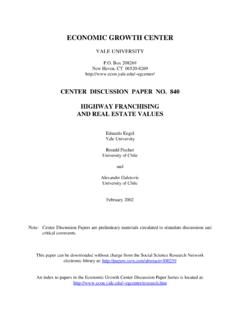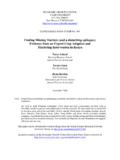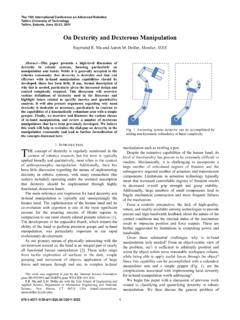Transcription of Statistical Studies of Financial Reports and Stock …
1 1 First Draft September 13, 2011 Statistical Studies of Financial Reports and Stock Markets1 Shyam Sunder, yale University Abstract It is often claimed that Statistical Studies of covariation between Financial and Stock market data can help set better Financial reporting policy. Such covariation, even when it can be estimated, tells us little about which Financial Reports help make better Financial decisions. A case in support of such claims remains to be made. Keywords: Financial reporting policy, efficient markets, Statistical covariation JEL Codes: M41 It is possible to define better Financial reporting in terms of observable characteristics of the system, such as relevance, reliability, timeliness, et cetera. Such assessments, being dependent on context, are difficult to generalize; and it seems more attractive to assess Financial reporting regimes on the basis of their observable consequences.
2 Market phenomena being more readily observable than individual and organizational behavior, this line of reasoning leads one to the goal of Financial reporting for better markets. Financial reporting serves many constituencies, including markets for capital, labor, and products and services. There has been a strong but largely unexplained inclination to focus attention on markets for capital, leaving the other two classes of markets out of the accounting discourse. Even within the class of capital markets, most attention has been given to markets for common equity of publicly traded corporations. This paper examines the inferences we may and may not be able to draw from Statistical Studies of Financial reporting and secondary markets for equity of public firms.
3 The focus on equity markets should not be taken suggest that the role of Financial reporting in other markets 1 An earlier version of this paper was presented at the Asia Pacific Journal of Accounting and Economics Symposium in Honor of K. R. Balachandran in Honolulu, Hawaii, on March 25-26, 2011. 2 is unimportant. Nor does it imply that better markets, however defined, necessarily lead to higher welfare or better society. Important as these questions are, they are outside the limited scope of this paper. Better Markets for Common Equity It is useful to have a shared view of what we regard as better markets for common equity. Once we have mapped the linkages between alternative Financial reporting regimes and characteristics of equity markets, we may have the chance to improve markets by selecting Financial reporting regime(s).
4 Concepts of perfect and complete markets in economics suggest a promising starting point. A market is regarded as being perfect if (among other things) (1) all participants have the relevant information, (2) no participant has the power to influence the prices, (3) the cost of entering and exiting the market is zero, and (4) all participants have access to the relevant production technology. A market is complete if all possible resources, and state-contingent claims on them, are traded readily. Perfect and complete markets are the idealized and simplified economic models of a complex world. Whether we can alter a market to be more perfect and complete, and whether such alteration is desirable, are difficult questions. When the mechanism to intervene in the markets, with imperfections of its own, is included in analysis, the results of such intervention are not necessarily closer to the goal of perfection.
5 The desirability of intervention depends on the point of view selected for analysis, because few interventions can bring about Pareto improvements in the status quo. The information condition for market perfection (mentioned as item 1 above) gives rise to the possibility of a linkage between Financial reporting and markets. However, Financial markets operate in an environment of uncertainty, where perfection is not achievable, and the goal-post ideal is shifted from perfect to efficient markets. Efficient markets are defined as those in which prices incorporate the aggregation of all information in possession of the market participants. In other words, prices in efficient markets are the same as they would be had every participant possessed the aggregation of all the information possessed by each of its individual participants.
6 As Hayek (1945) pointed out, markets function as aggregators of bits and pieces of information in possession of the traders. 3 The market s aggregation property, to the extent it is valid, tells us little about which pieces of information should be in the hands of which traders, and when traders should have the information for markets to be more efficient. Since much of the information about businesses concerns uncertain events of the future beyond anyone s knowledge, making all information available to all the traders is not possible. Of the limited amount of information possessed by corporate managers, making it all available to the public has proprietary, regulatory, and competitive implications. Further, it is not clear what mechanism(s) can be used to induce managers to disclose information when they do not think that disclosure will serve their own personal interests.
7 Statistical analyses of linkages between Financial Reports and Stock market data have sought to guide Financial reporting policy. The argument is vaguely appealing: (1) Stock markets are efficient in the sense of reflecting all relevant information in the prices; (2) we can therefore use guidance from Stock markets to identify which information (and which information-generating accounting methods) markets find relevant to determination of prices; (3) this can be achieved by identifying the accounting methods which produce data with greater Statistical proximity ( , higher product moment or rank correlation) with Stock prices; and (4) such methods of accounting can be used to promote market efficiency. Since ideal markets in the presence of uncertainty are efficient, this method of arriving at accounting policy will promote market efficiency, and thus better markets.
8 Each of the four links in this argument calls for some scrutiny. 1. Stock markets are efficient What is the sense in which Stock markets can be regarded as efficient, and what are the implications of the various available interpretations for Financial reporting policy? Interpretations range from the price is right to more or less tautological statements about efficiency ( , price is a function of the information system associated with the market, and each information system generates its own efficient market price). Under the first interpretation, price, being independent of the information system, becomes irrelevant to determination of Financial reporting policy. Under the second interpretation, the choice of reporting policy requires choosing among the multiple efficient equilibria (see Kanodia 1980 on 4 multiple efficient equilibria and Sunder 1989 on the problems of using event Studies from efficient markets to guide accounting policy).
9 2. Use accounting methods relevant to the determination of prices This is a common sense argument. The problem is that, under the first interpretation of efficiency, accounting methods do not matter. Under the second interpretation, all accounting methods (excluding trivial equivalents) are relevant. 3. Statistical proximity ( , correlation) as identifying criterion If we use Statistical proximity between accounting and Stock market variables as the criterion for choosing among accounting alternatives, achieving greater proximity, indeed identity, is trivially simple: use market variables as the basis of accounting. For example, if income were measured as the change in market capitalization of equity (adjusted for capital transactions and dividend payments), the accounting measures would be identical to market measures.
10 Yet such a system, with perfect proximity between accounting and market variables, will provide no information to the market participants to assist them in making their investment decisions. 4. Such accounting methods promote efficient (better) markets As mentioned above, accounting methods chosen on the basis of greater Statistical proximity between accounting and Stock market variables provide no assurance that they will help make the markets more efficient or better in some specified respect. It has been popular to suggest that one should choose Financial reporting practices on the basis of Statistical covariation between accounting and Stock market data. I used this approach in my thesis (Sunder 1973, 1975), and found it to be problematic. Yet, here is a quote from a recent paper: This paper aims at determining the value relevance of Financial This study aims at explaining likely impact of Financial reporting by listed companies on the market prices of their shares.









